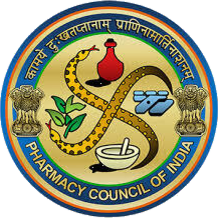Pharmacy Council of India
This article needs additional citations for verification. (May 2013) |
 | |
| Abbreviation | PCI |
|---|---|
| Formation | March 4, 1948 |
| Type | GO |
| Legal status | Active |
| Purpose | Regulation of the profession and practise of pharmacy |
| Headquarters | New Delhi, India |
President | Montukumar Patel |
| Pramod Yeole | |
| Website | pci |
The Pharmacy Council of India (PCI) is the statutory body under Ministry of Health and Family Welfare, Government of India. It is constituted under the Pharmacy Act, 1948.[1] The Council was first constituted on 4 March 1948.[2] Montukumar Patel is elected as new president.[3][4]
Members[edit]
The Pharmacy Council of India is constituted by central government every five years. . There are three types of members collectively forms a frame of PCI
- Elected members
One member is elected by"Medical council of India". One "registered pharmacist" elected by state council.
- Nominated members
six members are nominated by the "Central Government"
- Ex-officio members
1) The Dirctor Journal, Health Service,Ex-offico.
2) The Drug Controller Of India.
3) The Director Of Central Drug Laboratory.
Objectives[edit]
The objectives of the PCI are:-
- To regulate the pharmacy education in the Country.
- To allow the registration as a pharmacist under the pharmacy act.
- To regulate the profession and practice of pharmacy.
Main functions of PCI[edit]
The main functions of the PCI are:[5]
- To prescribe minimum standard of education required for qualifying as a pharmacist. (Ref.: section 10 of the Pharmacy Act)
- Framing of Education Regulations prescribing the conditions to be fulfilled by the institutions seeking approval of the PCI for imparting education in pharmacy. (Ref.: section 10 of the Pharmacy Act)
- To ensure uniform implementation of the educational standards throughout the country. (Ref. : section 10 of the Pharmacy Act)
- Inspection of Pharmacy Institutions seeking approval under the Pharmacy Act to verify availability of the prescribed norms. (Ref.: section 16 of the Pharmacy Act)
- To approve the course of study and examination for pharmacists i.e. approval of the academic training institutions providing pharmacy courses. (Ref. : section 12 of the Pharmacy Act)
- To withdraw approval, if the approved course of study or an approved examination does not continue to be in conformity with the educational standards prescribed by the PCI. (Ref.: section 13 of the Pharmacy Act)
- To approve qualifications granted outside the territories to which the Pharmacy Act extends i.e. the approval of foreign qualification. (Ref. : section 14 of the Pharmacy Act)
- To maintain Central Register of Pharmacists. (Ref. : section 15 A of the Pharmacy Act)
References[edit]
- ^ "Pharmacy Council of India". www.pci.nic.in. Retrieved 10 July 2021.
- ^ Gopal, M. Sai. "Pharmacy Council notifies clinical pharmacist posts in hospitals". Telangana Today. Retrieved 10 July 2021.
- ^ "Pharmacy Council of India appoints Montubhai Patel as new President - Express Pharma". www.expresspharma.in. Retrieved 20 May 2022.
- ^ ruchika (9 April 2022). "Pharmacy Council of India elects Montubhai Patel as new President". medicaldialogues.in. Retrieved 20 May 2022.
- ^ "Information published in pursuance of section 4(1) (b) of the Right to Information Act, 2005". Pharmacy Council of India. Retrieved 15 May 2013.
